
Cambridge certification test. Text about travelling and multiple choice questions. You follow your teacher's advice, start reading and suddenly ... 'set off'. Again the phrasal verbs; you don't remember its meaning and you don't know what to answer.
This situation may be familiar to many of you as the list of phrasal verbs is very extensive and is often difficult to remember. However, there are a number of them that are often repeated in certification tests such as First Certificate, Advanced, Proficiency, IELTS or TOEFL and it is convenient to know and remember them.
First let's have a look at what phrasal verbs are. These are verbs composed of two or three words (put up with), verb plus adverb or preposition, and when used together often acquire completely different meanings (fall out) or sometimes, meanings similar to Spanish (go up). It can also happen that the adverb or preposition does not add any meaning and you can use the verb with or without particle (swell - swell up). Native English speakers use them very happily but for non-natives they are like hell.
Most of the time these phrasal verbs usually have an equivalent much easier to understand (put off - postpone). However, if native speakers used these synonyms, one of the most defining features of the English language would be lost, that is making life impossible for non-native speakers who take certification tests.
Below we will look at the most common phrasal verbs in certification exams divided by lexical fields and with some examples.
Trips. See off someone – say goodbye to someone who is going on a trip. Set off – depart on a journey. I'll see you off tomorrow at the station before you set off.
Relations. Get on well – have a friendly relationship, get along. Fall out – argue. Laura and Monica got on very well until they fell out and now they don't talk to each other.
Money. Come into money – inherit. Rip off someone (cheat) When Jim's parents died he came into some money but his lawyer ripped him off.
Health. Swell up – get inflamed. Get over (recover) – to recover from an illness. After being stung by a bee his arm swelled up but he got over it quickly.
Schedules. Put off something – postpone. Call off something - cancel. The tennis game was put off 30 minutes due to the bad weather before being called off.
Solutions and excuses. Come up with a solution or excuse – to think of. Make up an excuse (invent). Stop making up excuses and come up with a solution to our problem.
Work. Set up a business – start. Take on someone - employ. My mum set up her own business and took on three people to work for her.
Problems with clients. Put up with someone – bear, tolerate. Deal with a problem – deal. I cannot put up with these rude clients anymore, could you deal with their problem now?
So, if you are going to take a Cambridge exam, remember these phrasal verbs that we have just seen. Or you can also have a look at our official exam preparation courses at this link and get the best preparation possible and with the greatest teachers.















